more books: -1- -2- -3- -4- -5-
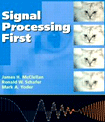 (11)James H. McClellan, Ronald W. Schafer, Mark A. Yoder, Signal Processing First, Prentice Hall, 2003
(11)James H. McClellan, Ronald W. Schafer, Mark A. Yoder, Signal Processing First, Prentice Hall, 2003
I consider this book as a signal processing enabling book and I use it with my students at the University as an introduction, previous to networking or Multimedia specific subjects. I recommend this book to anyone who is looking for a gentle introduction to digital signal processing, and is no willing to pass through a high math path. The math's are there but in their just proportion. The author is concerned about concepts, and the movies on the CD are of great help in order to get them. Th introduction to complex notation, difference equations and convolution are the gentles I've read. If you manage to solve the numeric exercises, you end with working concepts and skills in the area. The authors try to give examples from several fields like sounds, pictures and video in order to make the material understandable. Its not a very rigorous book but is a valuable one if you prefer concepts to mathematical rigor. After working the proposed projects, you can deal with filtering, image analysis, sampling, aliasing and several other signal processing techniques knowing what you are doing.
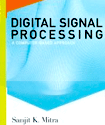 (12)Sanjit K. Mitra, Digital Signal Processing: A Computer-Based Approach, Third Edition, McGraw Hill, 2006
(12)Sanjit K. Mitra, Digital Signal Processing: A Computer-Based Approach, Third Edition, McGraw Hill, 2006
This book is wonderful as a reference for those conversant in DSP. This book's primary strength is the breadth and depth of the material covered. This book contains material on a wide variety of topics; more than most DSP textbooks. The other selling point of this book is its close association with MATLAB. There are quite a few MATLAB examples in the companion CD. Using MATLAB makes learning DSP much easier and more intuitive. The reader can play around with the example programs to get a real feel for the subject matter. Beginners might find this book a bit difficult to read through. In a few places the explanation is either not clear or could have been written more intuitively. For newbies, I would probably suggest other books which are better written (such as Proakis).
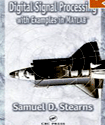 (13)Samuel D. Stearns, Digital Signal Processing with Examples in MATLAB, CRC, 2003
(13)Samuel D. Stearns, Digital Signal Processing with Examples in MATLAB, CRC, 2003
The book is very good as a background for beginners in DSP, when they are going to use MATLAB, as a tool. The readers may undesrtand the text, without very sophisticated knowledge in mathematics and MATLAB procedures. However, it would be better, if the author could write more about several, used frequently, areas of modern DSP applications - new methods of time-frequency analysis (for example wavelets etc.), dynamic 3D image analyses, with many typical examples using MATLAB.
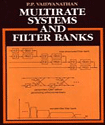 (14)P.P. Vaidyanathan, Multirate Systems and Filter Banks, Prentice Hall, 2003
(14)P.P. Vaidyanathan, Multirate Systems and Filter Banks, Prentice Hall, 2003
You'll get in this book a complete treatment of the theory of multirate systems and filter banks. The practical side is not the focus. The large number of examples and figures make it easy to follow (reading it from cover to cover is not that difficult). The intuition beyond the theory is well developed, at the expense of a light mathematical treatment. The geometrical and algebraic view provided by Vaidyanathan is unique and probably deserves to be taught in any DSP course for engineers, even at the introductory level. Signal processing people however could find its style too intuitive but engineers should like it as a reference book in these topics.
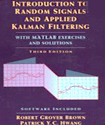 (5)Robert Grover Brown, Patrick Y. C. Hwang, Introduction to Random Signals and Applied Kalman Filtering with MATLAB Exercises and Solutions, Third Edition, Wiley, 1997
(5)Robert Grover Brown, Patrick Y. C. Hwang, Introduction to Random Signals and Applied Kalman Filtering with MATLAB Exercises and Solutions, Third Edition, Wiley, 1997
I have read over simplified and over complicated descriptions of the Kalman filter for years. The theoretical discussion is well matched to the examples. THe authors have obviously had extensive experiance TEACHING to a wide range of students andthe book benefits from their experiance.
more books: -1- -2- -3- -4- -5-
 (11)James H. McClellan, Ronald W. Schafer, Mark A. Yoder, Signal Processing First, Prentice Hall, 2003
(11)James H. McClellan, Ronald W. Schafer, Mark A. Yoder, Signal Processing First, Prentice Hall, 2003 (12)Sanjit K. Mitra, Digital Signal Processing: A Computer-Based Approach, Third Edition, McGraw Hill, 2006
(12)Sanjit K. Mitra, Digital Signal Processing: A Computer-Based Approach, Third Edition, McGraw Hill, 2006 (13)Samuel D. Stearns, Digital Signal Processing with Examples in MATLAB, CRC, 2003
(13)Samuel D. Stearns, Digital Signal Processing with Examples in MATLAB, CRC, 2003 (14)P.P. Vaidyanathan, Multirate Systems and Filter Banks, Prentice Hall, 2003
(14)P.P. Vaidyanathan, Multirate Systems and Filter Banks, Prentice Hall, 2003 (5)Robert Grover Brown, Patrick Y. C. Hwang, Introduction to Random Signals and Applied Kalman Filtering with MATLAB Exercises and Solutions, Third Edition, Wiley, 1997
(5)Robert Grover Brown, Patrick Y. C. Hwang, Introduction to Random Signals and Applied Kalman Filtering with MATLAB Exercises and Solutions, Third Edition, Wiley, 1997